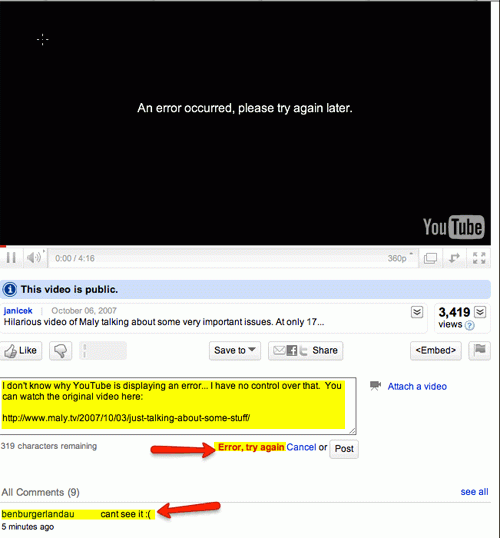The other day I was perusing Facebook to see what my friends were up to and I noticed, up in the upper right hand corner of my browser, that my neighbor had sent me a “Personal Message.” I clicked on the text teaser link that read: “I need a printer/scanner for my home use and…” because I thought she might just need to use our printer. Upon reading the message, I realized that she’d sent me that message via Facebook almost a month ago.
Then I went into my Facebook messages “inbox” to find that I had 60 unread messages, all from friends. I took the time to read all of these messages and reply appropriately. Although tempted, I purposely neglected to tell them, “you’re my friend and you have my email address. If you want to send me a message, send me an email!” at the risk of sounding rude.
I’ve had the same email address for going on 10 years. I own this email address because I own the domain (Janicek.com). Before Facebook, if you wanted to send me a message, you’d email me. Nothing’s changed there. You and I don’t “own” what’s on our Facebook walls, photo albums, notes and personal message inboxes — Facebook owns that stuff. If Facebook disappears, so does all of your content and correspondences. Maybe you don’t care, but I do.
Elise and I took a trip to New York City a couple years ago. Ordinarily I’d take a couple hours at the end of each day of a trip and write about our adventures and experiences and post them, along with photos and videos, on Janicek.com. Instead, I decided to micro-document the trip on Facebook because, as you well know, the rest of the world needs to know that we just saw a cardboard box full of geoducks in Chinatown AT THAT VERY MOMENT! A year later, Elise asked me if I recalled the name of the restaurant at which we ate in Little Italy. I told her to look on Facebook. She looked through months of my posts on Facebook and couldn’t find it. She couldn’t find anything about our trip to NYC on Facebook. I couldn’t either. After poking around on Facebook’s help forums, I found that Facebook only (at the time) archived 90 days worth of posts. The rest were thrown into the virtual void, never to be recalled.
And that’s when I decided that Facebook would henceforth only be a repository for inconsequential snippets and witticisms. It boils down to: you get what you pay for with any free social media outlet. Don’t get me wrong, I see the value in the likes of Facebook, Blogger, YouTube, Vimeo, Flickr, et al., but if it’s my [digital] content, I want it on my property.
Here’s a strong case. Recently some folks have been writing to me and saying, “I just saw that hilarious video of Maly babbling on so-and-so’s Facebook page!” After doing a few searches and reading some friendly and appreciative comments, I pointed folks to the same video on YouTube because if a video is going to go viral (hey, a guy can dream, right?), YouTube would be the medium to employ as it’s YouTube’s bandwidth, not mine. But I don’t own YouTube and I have absolutely no control nor explanation should something go wrong.
Less than a day after pointing people to the YouTube video, I noticed folks commenting that the video wouldn’t play. YouTube says, “An error occurred, please try again later.” So I decide to post a comment on YouTube that would direct people to the original video on the website that I own, that I have control over, and that I can remedy should the video no play for whatever reasons. I get an error when I try to post even a comment on YouTube. And I have absolutely no control over that. I don’t own YouTube and I don’t own even my own content on YouTube.
If I create something — a photo, drawing, video, story, observation, thought, affirmation, anything — I want to own that creation. I want to look back in 1, 5 and 10 years time and re-read and re-experience that creation. A free service like Facebook or YouTube doesn’t afford me the peace of mind that in even as short a timespan of 6 months, that my creation will still be there.
In a similar vein, I’ve witnessed the proliferation of “professional” photographers who market themselves by means of ITakeCuteBabyPhotos.blogspot.com. If I was to hire a photographer, I would immediately weed out those who use a free Blogger (or other) account. To me, a photographer who uses the digital medium must equally understand and master both the art and the technology. The photographer has invested thousands of dollars in photography equipment and countless hours in training or self-taught methods to achieve an aesthetic balance of technology and vision. If you expose and advertise your personal brand and your investment in yourself via a vehicle that you don’t own and have little or no control of its fate thereof, then I know what I’m going to be paying for.
If you create great things, own them. In the end, they only matter to you, right?


Delete the original video on YouTube, and upload it again. Perhaps whatever gave you problems the first time, won’t be there the second time. Sounds like you don’t have much to lose, and everything to gain… Brilliant, by-the-way… And, yes, it’s viral on Facebook.
I have a YouTube account and am uploading a bit these days. When I notice a typo (I can be so sloppy, sometimes) I just delete, fix, and upload again. Best to you…
Thanks, Jo (for both the comments and suggestion!) I’ve re-uploaded the video to YouTube and it seems to be working.